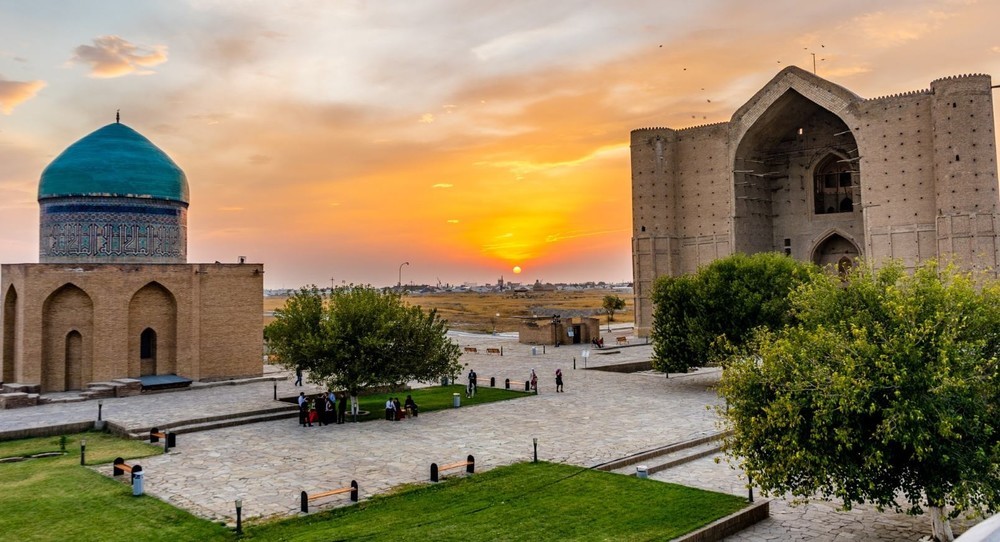Turkestan, the spiritual centre of Kazakhstan
Also called 'the pearl of the Silk Road' Turkestan is one of the oldest cities in Central Asia. In recent times, the figure of the dervish Khwaja Ahmad Tasavi, an Islamic preacher and Sufi poet, whose mausoleum is the destination of large pilgrimages, has been re-evaluated. Today, it seeks to combine futurist dimensions with the legacy of the past.
Turkestan (AsiaNews) - A series of cultural and advertising propaganda events are currently highlighting the particular charm of the city of Turkestan, presented as the "spiritual center of Kazakhstan".
Also defined as "the pearl of the Silk Road", Turkestan is one of the oldest cities not only in Kazakhstan, but in all of Central Asia, of which it intends to represent not only "the glorious past, but also the dynamic present and prospects of the future”, as written in a CentralAsia report.
Founded in 490 AD, the city reached its peak in the 12th century. Surrounded by mighty walls and watchtowers, Turkestan became the administrative center for many Central Asian lords and commanders of the Chorasmic, Mongol, Timurid and Shaibanid dynasties, later becoming the capital of the Kazakh Khanate between the 16th and 18th centuries.
A meeting place between nomadic and settled cultures, but also a crossroads between trade routes, the most solemn khan enthronement ceremonies took place in Turkestan, in the presence of representatives of many other states.
On several occasions in recent times the figure of the dervish Khwaja Ahmad Tasavi, who lived in the 12th century and to whom at the end of the 14th century a large mausoleum was dedicated on his tomb, in the territory of the Khazret-sultan museum, his literary title, has been re-evaluated.
Central Asian philosopher, Islamic preacher and Sufi poet, he wrote works in the Uyghur language of the first Muslim dynasty in the region, that of the Karakhanids, to which the Turanian populations of all of Asia refer, up to China's Xinjiang.
The mausoleum today is the destination of large pilgrimages, which if repeated at least three times are equivalent to the canonical one in Mecca, making Turkestan a true Islamic sanctuary.
Next to the sacred tomb of Tasavi were placed several museums and impressive buildings, recently restored and reorganized such as the Koltobe and the Khuma mosque, and also the “underground” mosques of Aulye Kumšyk and Khilbet and the Šildekhan ritual complex, together with an oriental sauna in the medieval citadel, the so-called Šakhristan, the "city within the city" within the walls.
Other mausoleums are dedicated to the khans and powerful people of local history, forming a complex of over 100 historical and archaeological monuments of great importance, with over 25 thousand objects on display, including manuscripts, architectural projects and ancient coins, visited every year by over 350 thousand tourists, not to mention pilgrims.
The reconstruction of Turkestan, which began in the decades of the government of President Nursultan Nazarbaev, seeks to place futurist dimensions alongside the legacy of the past. Many museums and centers have opened in the new part of the city, with ultra-modern forms of exhibition, such as the Yuly Dala Eli center and the Khodži Akhmeta Yasavi and Altyn Samuryk museums.
One of the best known architectural complexes, among the recent ones, is the Karavan-saraj, which aims to make visitors relive the sensations of the ancient Silk Road, with the streets of traders and artisans' shops, the caravans and bazaars of ancient times .
The theater could not be missing, or rather the recently completed "flying theater", an amphitheater for knightly events, in the middle of an infinite shopping center with all services, cinemas, bars, restaurants and spas for the relaxation of customers.
The center stands on the network of water canals, where scenes of "Boat Parades" also take place which intend to represent the new routes of the future of Kazakhstan and the entire Central Asia.
30/03/2021 11:33
02/01/2021 10:32
31/01/2020 12:50







.png)










